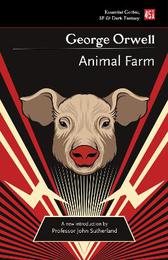
|
Animal Farm
Paperback / softback
Main Details
| Title |
Animal Farm
|
| Authors and Contributors |
By (author) George Orwell
|
|
Introduction by John Sutherland
|
| Series | Essential Gothic, SF & Dark Fantasy |
|---|
| Physical Properties |
| Format:Paperback / softback | | Pages:192 | | Dimensions(mm): Height 198,Width 130 |
|
| Category/Genre | Modern and contemporary fiction (post c 1945) |
|---|
| ISBN/Barcode |
9781839642395
|
| Classifications | Dewey:823.912 |
|---|
| Audience | |
|---|
| Illustrations |
3 Line drawings, black and white
|
|
Publishing Details |
| Publisher |
Flame Tree Publishing
|
| Imprint |
Flame Tree 451
|
| Publication Date |
16 February 2021 |
| Publication Country |
United Kingdom
|
Description
With a new introduction by Professor John Sutherland, this edition takes a fresh look at one of the great works of the twentieth century. Animal Farm is a moral animal fable written to highlight the weakness of humankind, and satirise the rule of Stalin, whose rise through revolution ended in totalitarianism. Peppered with slogans such as 'All Animals Are Equal', Orwell undermines the dark treachery of the pigs with a simple economy of style as, open-eyed and naive, the other animals allow themselves to be outmanoeuvred. By the end of the book the pigs are as corrupt and arrogant as the humans they replace. For many, the book was a wider allegory of human behaviour, a lament; but for others it was a call to action that foreshadowed the Cold War, where differing world views would attempt to adopt Orwell's great work for their own purpose. AUTHOR: George Orwell, the pseudonym of Eric Arthur Blair, was born in Bengal, India, in 1903. He was educated at Eton, became a policeman in Burma but suffered and studied poverty. His great works, Animal Farm and Nineteen Eighty-Four, are a product of his hatred of totalitarianism. His legacy of writing and political thought is much admired today. 3 illustrations
Author Biography
George Orwell, the pseudonym of Eric Arthur Blair, was born in Bengal, India, in 1903. He was educated at Eton and became a policeman in Burma. After leaving the police, he began to investigate the poverty in India and Europe which shaped his thinking about equality, money and power. His great works, Animal Farm and Nineteen Eighty-Four, are a product of his hatred of totalitarianism in all its forms and he was as critical of Stalin in the 1930s as he was ready to fight Fascism in the Spanish Civil War. His legacy of writing and political thought is much admired today. He died of tuberculosis in 1950. John Sutherland is the Lord Northcliffe Professor Emeritus of Modern English Literature, UCL, and has taught at the University of Edinburgh and the California Institute of Technology. A Fellow of the Royal Society of Literature he is the author of many books and articles including the well-received Orwell's Nose: A Pathological Biography in 2016 and Stephen Spender: The Authorized Biography (2004).
|